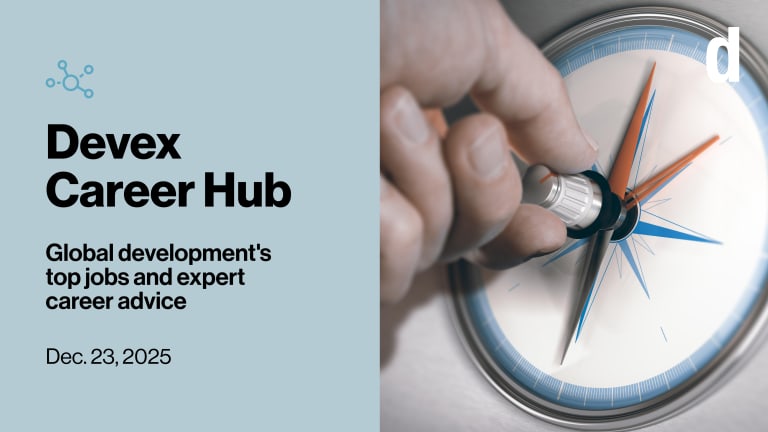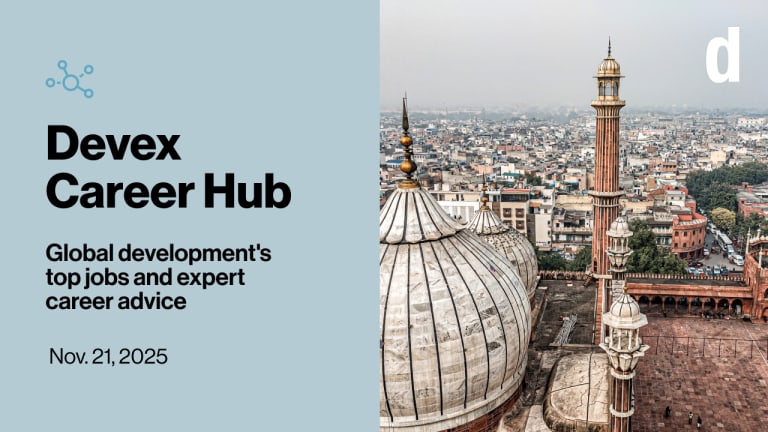Development consultancy trends for 2026
As numerous factors shift the development job landscape, Devex looks at how these will play out for consultants in 2026.
The entire job landscape within global development is shifting and consultants are not immune. Much of the turbulence of 2025 — from funding cuts to the rise of artificial intelligence — will play out in the year ahead, said experts and consultants. “After shifts in United States foreign aid and Europe’s geopolitics, social sectors like health and cross-cutting areas such as inclusive development has slowed considerably. On the other hand, however, climate work is up,” said Lauro Vives, co-founder and managing partner of Pacific Development Consulting. As the sector adapts to limited resources, subsequent change for consultants in 2026 won’t necessarily be a bad thing, suggested Vignesh Shankar, managing director of the Mumbai office of FSG, a global nonprofit consulting firm. “The potential to create impact is bigger now than it was a few years ago,” he said, adding that so too is the learning potential “because you're dealing with a lot more uncertainty and a lot more ambiguity, and these are things that make you a better consultant.” To better equip consultants for that uncertainty, Devex asked the professionals what lies ahead for development consultancy in 2026 and how to best prepare. 1. The job market will become more competitive The significant job losses in aid and development this year mean many professionals will still be unemployed in 2026 and potentially considering consulting gigs. Heather Brown, a Sydney-based specialist who focuses on gender equality and monitoring and evaluation, has been a consultant for 12 years and is regularly being contacted by ex-colleagues about the viability of a similar career move. “I can see that there's going to be a lot more consultants, a lot more freelancing in the market,” she told Devex, making the job landscape more “competitive.” At the same time, there will likely be fewer contracts available as NGOs and development agencies begin to feel the reality of reduced budgets, meaning fewer resources to engage outside support. “If you see yourself as a development sector consultant that works mainly with overseas development aid funds, then it's very clear that 2025 was a massive shrinking in the overall base,” Gaurav Gupta, global managing partner at Dalberg Advisors, said in an email. Even within consulting firms, there’s been a reduction of spending budgets, said Shankar. That said, diminished in-house staff could also create opportunities for consultants to fill a gap. “Consulting opportunities will outpace employment growth in this space simply because work still needs to get done,” said Vives. Devex’s jobs board currently features several consultancy roles, including a proposal writer for the AGRA, a mapping consultant for the International Agency for the Prevention of Blindness, and a data analyst for the Norwegian Refugee Council. 2. The nature of available roles will shift In the roles on offer, professionals might see a shift in the scope of work as organizations look to merge multiple tasks due to budget constraints. For example, Brown said she has seen consultancy gigs that combine gender, disability, and inclusion work with climate change. “It’s an area that used to have two and three consultants … If you think about it in a positive light, it's promoting an understanding of intersectionality, but what it means is there’s less jobs for consultants and less specialization,” she said. One area that Vives highlighted as having more work available is in climate change. “We are forecasting a resurgence of consulting opportunities in the traditional sectors, such as health and education, but with a climate lens,” said Vives. “For example, climate-resilient schools, or the implementation of early-warning systems for climate-sensitive diseases.” Shankar said he is also seeing more consultancy assignments pop up in areas of decarbonization, just transitions, and adaptation. Additionally, there are opportunities to be had in helping NGOs streamline amid this funding squeeze, said Lilian Medina Romero, co-founder of The Bridge Sisters. The U.S. and Latin America-focused nonprofit consultancy, she shared, has already been helping clients rethink their scope and resources. 3. Local consultants will be in demand In line with the ongoing focus on localization, local consultants will continue to be more sought after in the year ahead, according to Brown, who said this has very much been the case in 2025. Where there are opportunities for international consultants, employers are looking for those who have networks of local consultants they can collaborate with and mentor, she explained. “It’s taking on more of that capacity-building approach as well as doing your consulting.” To enhance chances of being included in upcoming projects, Vives recommended reaching out to local consulting firms rather than international ones. 4. AI will change what consultants are contracted to do As in 2025, the use of AI will continue to grow in development and in some cases, replace aspects of the work often done by consultants, the experts told Devex. This will likely apply in areas of research, analysis, and evaluation, said Brown. But AI presents new opportunities for consultants too. “The work and the value that we as consultants have is when we know how to use AI in the right way,” said Medina Romero. In particular, Shankar believes consultants are primed to collect the data that AI models in development require. “The existing trend is just that many actors are rushing to start using AI in their work. What I'd like to see, and there is some talk about this, is a greater focus on getting good data sets,” he said. Where consultants are working with AI, they should understand the ethics around it, said Brown, and be transparent with clients about how it is being used in any projects. “The way that I've done that is, before doing any AI work, negotiating that as part of contract negotiations to see where organizations are at. Is it okay? Do they have a system?” said Brown. 5. There’ll be more collaboration Nine months on from the major USAID cuts, Shankar said he is seeing more interest from clients around collaboration on projects and on funding proposals to achieve greater impact. “Something that I'm looking forward to for next year and the year after is a lot more focus on structural collaborations … The need for this is greater than ever before, certainly in the global south,” he said, advising that consultants bear this in mind. That push for partnerships also opens up another pipeline of work. Consultants can help development players connect with each other to jointly pursue funding, said Medina Romero. “One thing that 2025 has taught us is that less competition, more collaboration is key for us as consultants to stay alive and remain relevant,” she said, adding that 30%--40% of The Bridge Sisters’ contracts this year have been pursued jointly with other consultants. Outreach to Pacific Development Consulting also doubled in 2025 for partnerships across Vanuatu and the region, said Vives. Gupta believes consultants will also have to collaborate more outside of the sector and with “every other part of the economy and society,” in order to meet development goals. Such a cross-cutting role could mean that “even this idea of a development sector consultant may be an anachronism,” he shared.
The entire job landscape within global development is shifting and consultants are not immune. Much of the turbulence of 2025 — from funding cuts to the rise of artificial intelligence — will play out in the year ahead, said experts and consultants.
“After shifts in United States foreign aid and Europe’s geopolitics, social sectors like health and cross-cutting areas such as inclusive development has slowed considerably. On the other hand, however, climate work is up,” said Lauro Vives, co-founder and managing partner of Pacific Development Consulting.
As the sector adapts to limited resources, subsequent change for consultants in 2026 won’t necessarily be a bad thing, suggested Vignesh Shankar, managing director of the Mumbai office of FSG, a global nonprofit consulting firm. “The potential to create impact is bigger now than it was a few years ago,” he said, adding that so too is the learning potential “because you're dealing with a lot more uncertainty and a lot more ambiguity, and these are things that make you a better consultant.”
This article is exclusively for Career Account members.
Unlock this article now with a 15-day free trial of a Devex Career Account. With a Career Account subscription you will get:
- Full access to our jobs board, including over 1,000 exclusive jobs
- Your Devex profile highlighted in recruiter search results
- Connections to recruiters and industry experts through online and live Devex events
Start my 15-day free trialAlready a user?
Printing articles to share with others is a breach of our terms and conditions and copyright policy. Please use the sharing options on the left side of the article. Devex Pro members may share up to 10 articles per month using the Pro share tool ( ).
Rebecca L. Root is a freelance reporter for Devex based in Bangkok. Previously senior associate & reporter, she produced news stories, video, and podcasts as well as partnership content. She has a background in finance, travel, and global development journalism and has written for a variety of publications while living and working in Bangkok, New York, London, and Barcelona.








